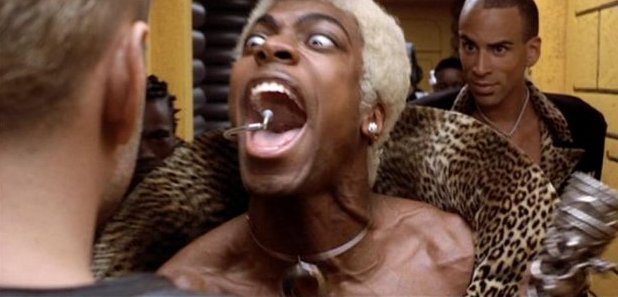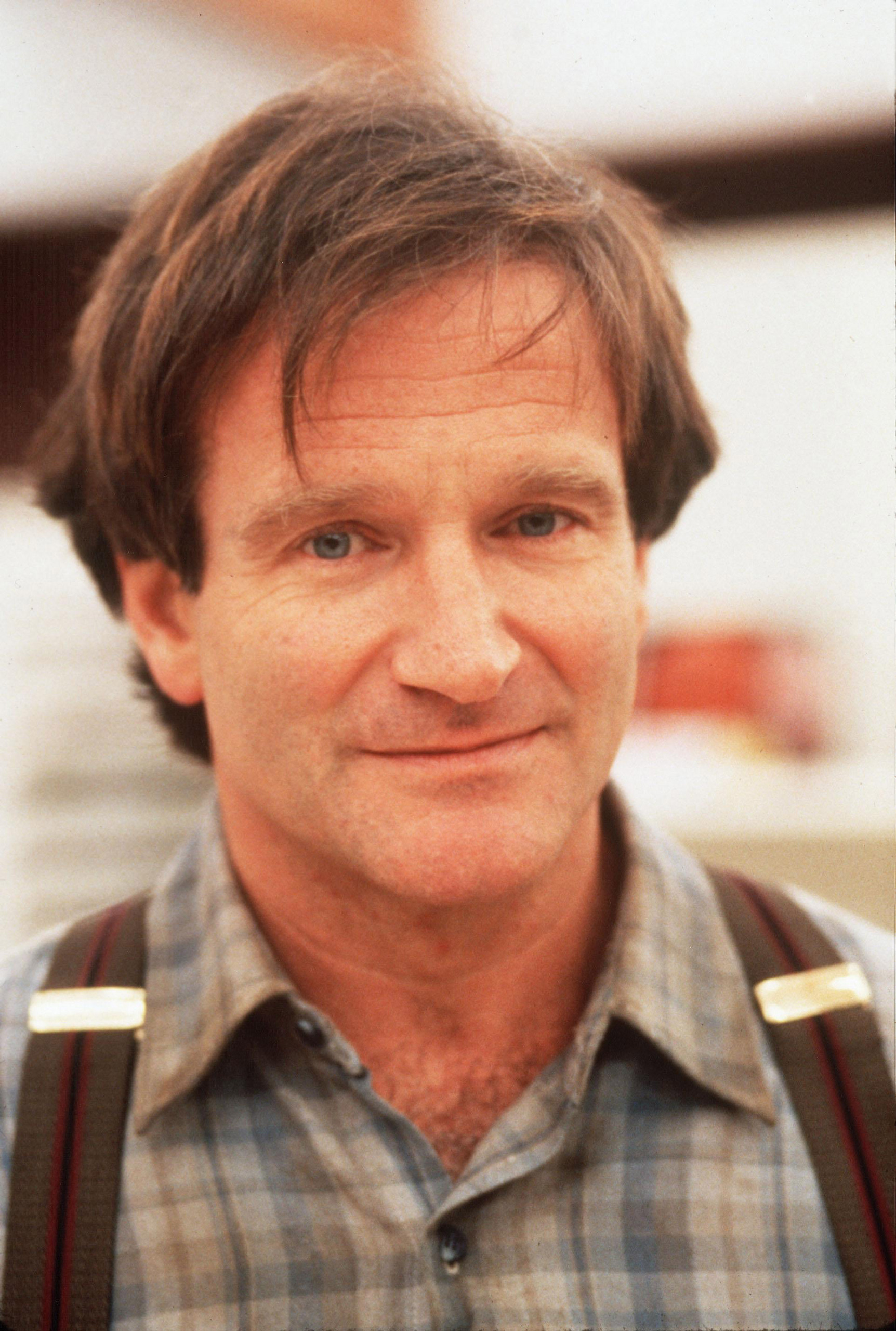 |
| Chris Tucker being just horrible in the Fifth Element. Source: cdnds.net |
Following my outrage over Adam Sandler’s existence, I wanted to do a quick, simpler article reflecting on the diminutive career of one of the most annoying performers of the millennial era. Well, referring to the career of Chris Tucker as “millennial” may be pushing it. Still, he did appear in a few films post-2000… Like I said: A quick article… Yeah, right.
Chris Tucker’s most notable early performance was in the popular comedy Friday. The movie was okay, not awful, but Tucker himself stood out. The bug-eyes, loud-mouthed shrieking, his flamboyance, the boisterousness of his performance... I’m not sure what clicked with audiences but something did, at least for a while. He gained a little more notoriety in a supporting performance in the Hughes Brother’s Dead Presidents, a heist film about a war vet trying to make ends meet on the streets. The movie was met with mixed reviews, as was the Hughes’ other ode to ghetto life, Menace II Society. Both films were criticized by some for supposedly glorifying street violence. Chris Tucker was obviously not up to the task of maintaining such a controversial track record, so he went back to playing the loudmouth comic relief roles that got him started.
The Fifth Element was a change of form for filmmaker Luc Besson, whose previous works like La Femme Nikita and Leon: The Professional were tough, gritty and risque. The Fifth Element, on the other hand, was more of a fun sci-fi romp. It was good… for the most part. Yet, it did have one glaring issue: Chris Tucker was in it. Now, I do not mean that he is in it for a few scenes then forgotten about. No, he is a major character in the story despite having demonstrably nothing to do with the plot. The Fifth Element has a cast member named “Tricky”. His actually named on the credit roll is Tricky... and Chris Tucker is out acted by this guy. This is the level of talent we’re dealing with here.
The Fifth Element bombed at the box office but did get some new life on home video and has since earned an admirable cult following. Still, Chris Tucker was not deterred, obviously, as he went on to star in the comedy Money Talks alongside Charlie Sheen, who was already more or less a wash-out at the time. Together, Tucker and Sheen were about as captivating as two Big Brother contestants that are locked in a room and given a double-dose of Ritalin. The movie was boring, lame and all-around unsuccessful, despite making its meager $25 million budget back… barely. However, the film’s director, Brett Ratner, was not done with Tucker yet. First, however, Chris Tucker had to appear in his obligatory good movie.
This good movie is not something that is simply likable like the Wedding Singer. No, Chris Tucker had the balls to be in one of the single best movies of the 90’s: Jackie Brown. Quentin Tarantino’s throwback of a suspense flick starring former blaxploitation princess Pam Grier was a slam dunk. However, I am more than happy to say that Chris Tucker’s part in this film was particularly small, only amounting to a few seconds of screen time, so I don’t have to give him any credit for it! HA! This is the point where a majority of people had almost forgotten Chris Tucker entirely. He was still acting fairly regularly but most of his roles since Friday were either small, or in movies nobody saw. That changed in 1998.
Remember when I mentioned that Brett Ratner was not done with Tucker? Well, here is the culmination of that “filmmaker’s” misplaced confidence. The early 90’s saw a sudden stateside resurgence in the popularity of Hong Kong martial arts cinema, most notably in the form of a growing interest in superstar Jackie Chan. He had already released a number of his homeland successes re-dubbed in English for American audiences and they did well... for the most part. So, by the late 90’s, the Hong Kong action hero realized he could make significantly more money in U.S. productions, and he did just that. A majority of Chan’s American successes so far had been from Hong Kong filmmaker Stanely Tong. However, in order to garner further favor with American audiences, Chan’s big move would require him to work more with Hollywood producers, directors and actors, and this move was the birth of the absolutely brain-melting Rush Hour.
Brett Ratner’s style has always been something along the lines of: Film a bunch of action crap and edit in lots of shots of stars swinging, sliding, screaming and hurdling about. His style is chaotic and actually, very uninteresting. There is often literally so much going on that your brain just sort of tunes most of it out, and one finds themselves ultimately bored. I can best compare a Brett Ratner film to one of those 3D Magic Eye prints from the 90’s. Once you learn to see the sailboat, it is kind of cool. Yet, no matter how seemingly-awesome what you are seeing really is, eventually you get tired of it and find yourself wanting to do something productive with your time. I think Willam went on to be a Neo-Nazi (double-movie-reference!).
Rush Hour is a special level of bad because it featured Chris Tucker at his worst and Jackie Chan at his most unintelligible. Chan was trying in this load of crap but the shame on the veteran action star’s face is palpable throughout the film. This is accentuated by the fact that Chris Tucker ultimately dominates much of the movie. Between bouts of not being able to understand half of Jackie Chan’s dialogue (a problem addressed in the movie as a gag) and Tucker being an obnoxious douchebag through the entire film, I just felt bitter. Add to that Chris Tucker’s actual lines, which are just back-to-back ethnic jokes at Chan’s expense, referencing numerous unfunny racist stereotypes that Hollywood still seems convinced are worthy of screen time. If the roles were reversed, and Chan was commenting endlessly about Tucker’s race, somehow I don’t see this movie having as many fans.
So that’s Tucker’s legacy. Yep, that's pretty much it. In 2001, Tucker and Chan reunited for the obligatory Rush Hour sequel (because the first film made money). It was the same movie except this time Tucker goes to Hong Kong! Oh-ho, ZANY! We get more lame references to Chan’s poor English, Tucker’s aggravating and chauvinistic lasciviousness, and a complete and total waste of Ziyi Zhang, which is just unforgivable. Her appearance in Rush Hour 2 is best compared to Jet Li’s in Lethal Weapon 4. She has no lines. She just does her villain-thing, has one lame fight scene at the climax and then is out of the movie. Pathetic!
Rush Hour 3 was released in 2007 to generally-negative reception. It barely cleared a profit. I did not see it, so I cannot comment on it. I just had no interest after the first two, and apparently neither did most people. So, now here we are, Chris Tucker has had three film appearances since 2001. He was in Silver Lining’s Playbook in 2012, which I found to be only an okay entry from rising filmmaker David O. Russell, and IMDB has Tucker listed in a rumored future role in Rush Hour 4. Given that Rush Hour 3 barely broke even, I don’t really see a third sequel happening. However, I have been wrong before. The way I see it, by the time Rush Hour 2 came out, the public at large had pretty much forgotten about Chris Tucker. Now, history has shown us that an actor can make a major comeback pretty quickly, so you never know. Still, I don’t see this happening with this mostly-forgotten has-been.



.jpg/436px-Adam_Sandler_2011_(Cropped).jpg)

